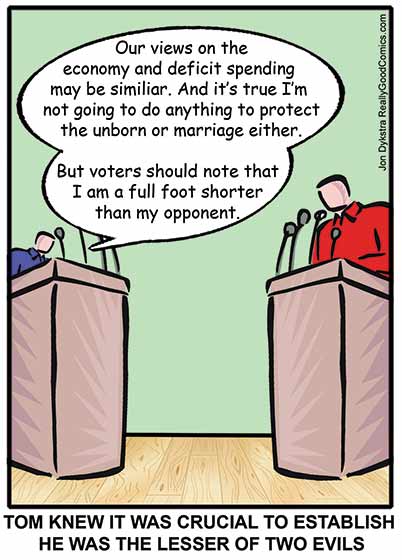What is humor? It seems a simple question, with a very obvious answer: humor is whatever makes us laugh or smile.
But then what of all the cruel pranks and the sacrilegious gags that make so many laugh? Even the crudest of comedians can get big laughs. The fact is, we laugh at a lot of things that just aren’t funny.
So we aren’t interested in simply what makes us laugh. Instead we’re going to explore genuine humor, the sort of humor that gets laughs but can be shared without shame – we’re going to explore Christian humor.
DEFINITION OF HUMOR
Humor is a term used in English since the early eighteenth century to denote a type of writing or speech whose purpose it is to evoke some kind of laughter. So laughter is a key element.
But we want to go deeper – we want to go beyond the knock knock joke. Instead of being something merely light or superficial, the best humor depends upon profundity. “A humorous rejoinder, ” said Kierkegaard, “must always contain something profound.” For example here’s a joke about a person getting their just deserts (as described in Galatians 6:7-8):
While doing his daily rounds a prison chaplain stopped in on a prisoner who had been assigned the task of making pillowcases for the entire 5,000 inmate prison.
“Good morning,” said the chaplain, “Sewing, eh?’
“No, Chaplain, “ replied the prisoner with a grim smile. “Reaping.”
Elton Trueblood observed that humor takes intelligence: “It is not possible to have genuine humor or true wit without an extremely sound mind, which is always a mind capable to high seriousness and a sense of the tragic.”
THE NEED FOR HUMOR
Sometimes humor is dismissed as being trivial but genuine humor is an important and effective tool in many settings. Properly used, it can allow us to see our lives in more realistic proportions, restrain an explosion of anger, and deliver us from pessimism and despair, and do so much more.
For example, it can be a wonderful educational tool and a means to restoring order in a classroom with a smile. It can even be a way to ensure better parent/teacher relations as a wise Grade 1 teacher was said to have done by sending the following note home on the first day of school:
“If you promise not to believe everything your child says happens at school, I’ll promise not to believe everything he says happens at home.”
Humor is a necessity within the church as well. When we lose our sense of proportion and humor, controversies in the church become battlefields. We look for “heretics” in each corner and even tend to look under our bed before we dare to go to sleep. We can be so busy with controversies we can no longer hear the footsteps of our approaching Lord, whose coming is at hand. And how sad it is to see people spend time and energy to paint their position in bright colors and put others in worse light than warranted. We may not build bomb-free shelters where criticism cannot enter.
Humor should not be overlooked in evangelism either. It is easy to visit people who are with you, but it is hard when they are filled with bitterness against the Lord and His church. With tact and humor we can make contact with people who are filled with criticism against church members, and especially ministers.
Real humor blossoms only where God’s Word has taken root. “A cheerful heart is good medicine, but a crushed spirit dries up the bones,” says Solomon (Prov. 17:23). So a Christian remembers that he is always in the presence of God, and his speech is the gift of the Creator. As Augustine put it:
“Speech is not simply our possession; it is God’s gift to us. To recognize and acknowledge this gift in truthful words is to offer grateful praise to the One from whom it comes.”
LAUGH AT YOURSELF
All of us ought to be ready to laugh at ourselves because all of us are a little funny in our foibles, conceits and pretensions. What is funny about us is precisely that we take ourselves too seriously. The ability to laugh at oneself shows we understand some of our imperfections. A Christian who understands he is living his life under the judging eye of God does not boast about his moral achievements. He understands that is pride and folly.
One of the qualifications of a missionary is a sense of humor – while learning a new language and new customs it is easy to make embarrassing blunders. When we were serving in the Philippines, I made my share, and a good laugh at myself helped me survive.
But there is another side to laughing at oneself. If we keep laughing when we have done something wrong, if we cannot recognize the real evil of sin, laughter turns into folly. If we continue to laugh after having recognized the depth of evil we have committed, our laughter becomes the instrument of irresponsibility.
DISTORTED HUMOR
It is easy indeed for humor to be distorted.
A.D. Dennison, a Christian cardiologist, says in his 1970s bestseller Shock it to me Doctor that he recalls one man who sped up to a drugstore and asked the druggist if he had anything for hiccups. The druggist, without a word, hit the man between the eyes and knocked him to the floor. The man slowly got up and graciously asked again, “Sir, do you have anything for hiccups?” The druggist replied, “You don’t have them any more do you?” The man responded, “No, I never did, but my wife out in the car does.”
This may be a clever joke, but it’s is devoid of compassion and respect for others. Is this Christian humor?
A type of humor often used during war is called “gallows humor.” Soldiers are known on occasion to engage in hysterical laughter when nerves are tense before the battle. They speak flippantly of the possible dire fate which might befall this or that man of their company. “Sergeant,” a soldier is reported to have said before a battle, “don’t let this little fellow go into battle before me. He isn’t big enough to stop the bullet meant for me.” The “joke” was received with uproarious laughter by the assembled comrades. But when the “little fellow” died in battle the next day, everyone felt ashamed of the joke. At any rate, it was quite inadequate to deal with the depth and breadth of the problem of death.
But as the American theologian Reinhold Niebuhr points out: “If we persist in laughter when dealing with the final problems of human existence, when we turn life into a comedy, we also reduce it to meaningless. That is why laughter, when pressed to solve the ultimate issue, turns into a vehicle of bitterness rather than joy.”
HUMOR IN THE BIBLE
If we are going to investigate true humor, then we must not overlook the Bible. The Bible deals with very serious subjects – heaven, hell, sin and salvation – but that should not cause us to overlook its literary beauty, and the humor in the Bible.
There are critics who regard the Bible as deficient in the sense of humor and they can point to the fact there is little laughter in the Bible. But the Bible is filled with humor. Humor in the Bible appears especially when idolatry is mocked. One powerful example occurs when Isaiah pokes fun at a man who carves an idol from wood. In chapter 44:15-17 he describes in some detail the absurd process:

“It is a man’s fuel for burning, some of it he takes and warms himself, he kindles a fire and bakes bread. Half of the wood he burns in the fire; over it he prepares a meal, he roasts his meat and eats his fill. He also warms himself and says, ‘Ah! I am warm; I see the fire.’ From the rest he makes a god, his idol; he bows down to it and worships. He prays to it and says, ‘Save me; you are my god.'”
GOD LAUGHS
The only instance in which laughter is attributed to God occurs in Psalm 2:4, which says, “The One enthroned in heaven laughs; the Lord scoffs at them.” This is not a happy image – God is pictured laughing at man and having him in derision because of the vanity of his imagination and pretensions. God mocks kings who plan to divide the world amongst each other, while God says to the Messiah, ” I will make the nations as your inheritance, the ends of the earth your possession” (vs. 8).
But the humor in the Bible is not limited to that of derisive laughter. Throughout Scripture God reveals a real sense of humor. When the human race wanted to build a city with a tower that reaches the heavens so that they could make a name for themselves, “the Lord came down to see the city and the tower that the men were building (Gen. 11:5). God acts as if the tower of Babel is so small that He can’t see it from heaven – He had to come down to see it.
And when Israel is threatened by the Philistines, God uses a most unlikely means to save His people so that the Messiah could come in the fullness of time. What does He do? God writes history with a small stone from a brook. Young David with a small stone smites Goliath and Israel was rescued.
JESUS AND LAUGHTER
The Heidelberg Catechism confesses that the eternal Son of God took to himself, “a truly human nature so that he might become David’s true descendant, in all things like us his brothers except for sin” (Q&A 35). So when we speak about Jesus and humor, we are not disrespectful, We accept His incarnation as real. He was seen as the carpenter’s son.
Christ’s characteristic humor depends, for the most part, upon a combination of ideas rather than upon a combination of words. But it is very important to understand that the purpose of Christ’s humor is to clarify and increase understanding rather than to hurt. When Jesus teaches His disciples about being light bearers in this dark world, he uses sly humor about where to put light. The message is about the necessity of witness, but the failure to be a witness is rendered laughable when Jesus asks, “Is a lamp brought in to be put under a bushes, or under a bed, and not on a stand?” (Mark 4:21). Since the lamp mentioned has an open flame, and since the bed is a mattress, it is easy to see that in this situation the light would be suffocated or the mattress would be burned. The appeal here is to the patently absurd. The sensitive laugh; they get the point.
When Christ said not to cast pearls before swine (Matt. 7:6), He was again employing the patently absurd to make His point. Christ tells us that we are not to waste precious words or time or effort on those who chronically resist the Gospel. We must remember, of course, that the joke about casting what is precious before the pigs was even more preposterous for a Jewish audience than it is for us. The rejection of pork was deep-seated in their consciousness.
Christ’s major weapon against the Pharisaic attack was laughter, and He used it fully. The point at which they were most vulnerable was their manifest self-righteousness. There is no one more ridiculous than the sinner who claims to be perfect. Jesus asked the Pharisees, who accused Jesus of casting demons in the name of Beelzebub, “If I drive out demons by Beelzebub, by whom do your people drive them out?” (Matt. 12:27). Jesus pokes fun at the critics, since everyone who listens will realize that the subtle question has no possible answer. Christ’s question really means, “By what demonic agency do you perform your miracles?” It is easy to see that the humorous question is a far more effective rejoinder than a serious argument about demons. The severest critics of Christ could not stand ridicule, for seriousness was their central strength.
CONCLUSION
What then is the secret of true humor? The answer is found in the Gospel. It is to know that you are a forgiven a sinner, to have no illusions about the self, and no inclination to appear morally better than you are, either in the sight of man or of God. Our release from bondage of sin gives joy. This joy expresses itself in an exuberance of which laughter is not the only one, but certainly one, expression.
Rev. Johan Tangelder (1936-2009) wrote for Reformed Perspective for 13 years and many of his articles have been collected at Reformed Reflections.













